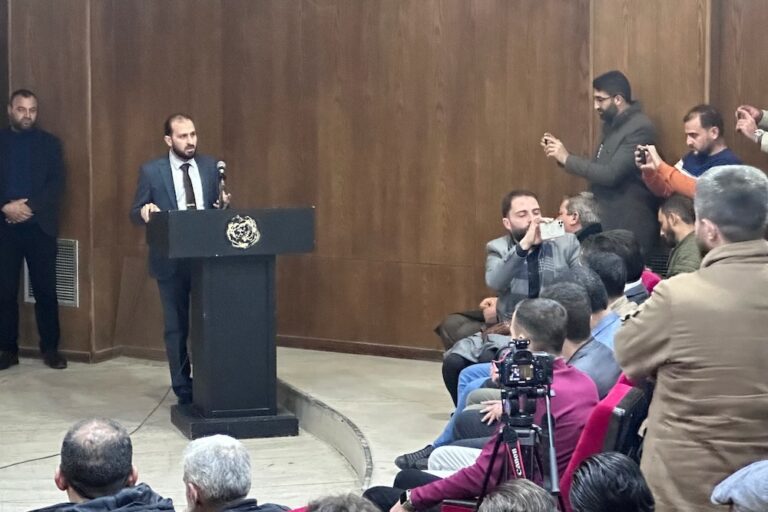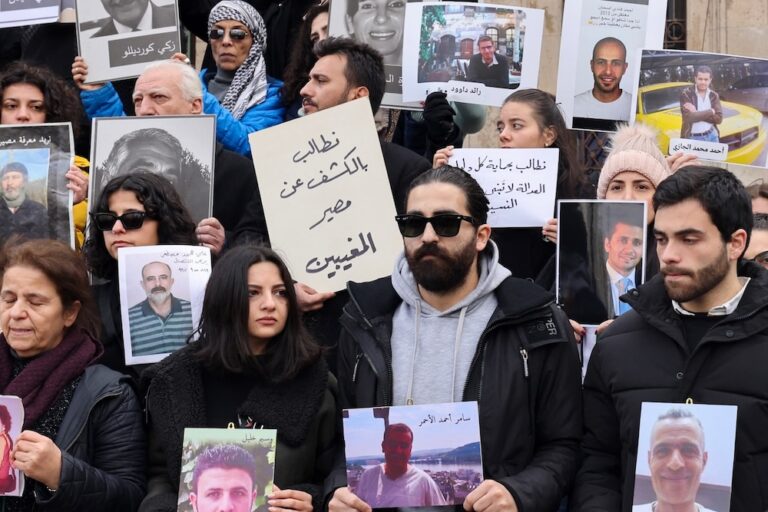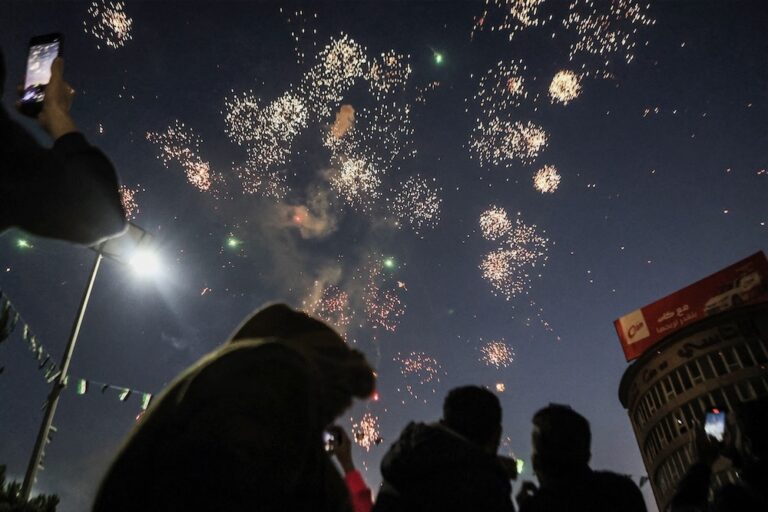(RSF/IFEX) – On the eve of World Human Rights Day (10 December 2004), RSF has urged Syrian President Bashar al-Assad to end the daily attacks on press freedom in his country. “Syria’s economic opening and political modernisation will just be empty promises if the authorities continue to block development of a free and independent media,” […]
(RSF/IFEX) – On the eve of World Human Rights Day (10 December 2004), RSF has urged Syrian President Bashar al-Assad to end the daily attacks on press freedom in his country.
“Syria’s economic opening and political modernisation will just be empty promises if the authorities continue to block development of a free and independent media,” the organisation said. “For the past three decades, state security agents have intimidated and cracked down on journalists, turning Syria into a very bleak place for the media. News is controlled by the ruling Baath Party and the government. If the authorities really want the country to rejoin the international community and improve its image, they must allow an independent media to emerge,” RSF added.
The latest attack on press freedom was the 2 December arrest of Syrian-Kurdish journalist Taha Hamid, in the northeastern border town of Kamishli, as he was returning from neighbouring Turkey. He was held in the army intelligence service prison in Damascus until his release on 5 December, according to human rights lawyer Anwar al-Bunni.
Hamid, a journalism student at Damascus University and a 37-year-old father of four, regularly wrote political and cultural articles for Kurdish-language news websites, notably the Germany-based site http://www.amude.com.
Hamid fled to Turkey following clashes in March between Kurds, Arab tribes and Syrian security forces in Kamishli, in which many people were reportedly killed, though this has not been confirmed by independent sources because of the regime’s grip on news.
Another Syrian journalist, Luai Hussein, who writes in the Lebanese press about corruption, has been banned from writing by the Syrian Interior Ministry.
On 21 November, two members of the Syrian “mukhabarat” (secret police) went to Hussein’s home in the northwestern port town of Lattakia and gave him a written order from the Interior Ministry’s political security department, instructing him to stop writing articles. He refused to sign the order.
Hussein told RSF by phone that he would continue to write in Lebanese newspapers, including the dailies “An-Nahar” and “As-Safir”. He said the ban was sparked by an article he wrote in “An-Nahar” in September about “the curse” of being a Syrian passport holder.
RSF also notes that Massud Hamid, a 29-year-old journalism student, has been imprisoned in Syria for more than 16 months. On 10 October, the State Security Court sentenced him to three years in jail for “belonging to a secret organisation” and “advocating the transfer of part of Syria to another country” (see IFEX alerts of 12 and 8 October, 22 July, 8 March and 16 February 2004).
Hamid was arrested on 24 July 2003 at Damascus University, a month after posting photographs of a peaceful demonstration by Kurds in front of UNICEF’s Damascus office on the website http://www.amude.com. He is being held in Adra prison, near Damascus, and has reportedly been tortured.
Hamid’s immediate release has been demanded by the Syrian Free Political Prisoners Committee. On 18 November 2004, the group launched a petition for the release of 400 political prisoners and some 200 Kurds arrested since March. The campaign will culminate with a sit-in in front of the cabinet office in Damascus on 10 December, the 56th World Human Rights Day.
The Committee’s leading figure, lawyer al-Bunni, deplored the fact that no Syrian media outlet has dared to mention the campaign. He said other Arab and Western media outlets have reported on the campaign, but no Syrian media representative attended the committee’s 18 November press conference, at which the petition was announced.
“I’m not surprised, since the Syrian media are slavishly obedient,” al-Bunni said. “It’s a regime-controlled press and journalists are just civil servants, more concerned about getting paid than looking for the truth. They know that anyone who steps over the set limits will be dealt with like the newspaper ‘Addomari’, which was shut down and which the authorities have still not allowed to reappear” (see alerts of 6 and 5 August 2003).
The Committee is comprised of five former political prisoners:
– Al-Bunni, arrested during a crackdown in Damascus in the spring of 2001 and imprisoned for three years.
– Imad Shi’ha, released a few months ago after spending 30 years in prison
– Hassiba Abdrahman, a female novelist who was jailed for seven years
– Yassin Haj Saleh, a writer and journalist who was held for 16 years
– Kamal Labwani, a medical doctor arrested in the spring of 2001, imprisoned for three years and released in September 2004
The Syrian Free Political Prisoners Committee’s petition can be signed at: http://www.togetherforsyria.org
Syria ranked 155th in RSF’s third annual worldwide press freedom index, published in October. President al-Assad has been placed on the organisation’s list of 32 “press freedom predators” around the world.


